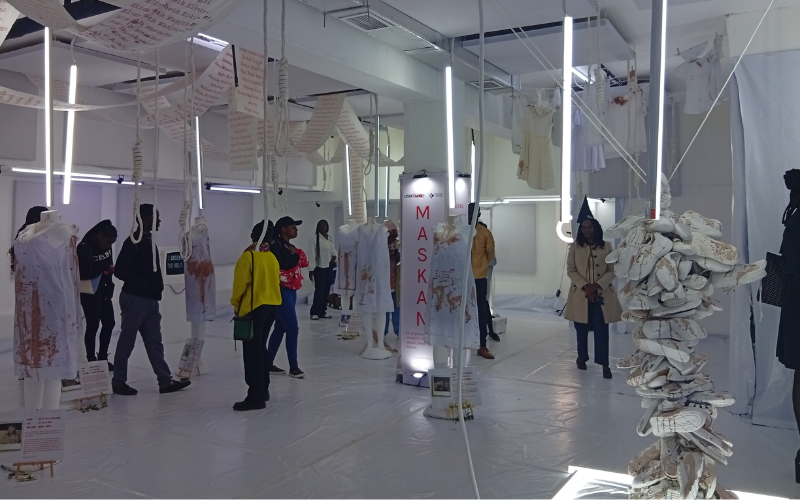A chilling art installation about femicide and gender-based violence in Kenya opened on August 7 at Creatives Garage at The Mall Basement in Nairobi.
Curated by Thayù, Maskan (translated to home) places femicide at its scene of crime and explicitly demonstrates how it is committed.
As you enter the gallery, every turn you make, you are met with mannequins dressed in white petticoat nightgowns, showing that femicide victims are mostly attacked in the comfort of their homes.
The gowns are stained with blood, and there are roses and tributes and photos of real victims placed at their feet.
On the left is an unsettling installation; there is a mannequin in a white nightgown lying on its belly on white bedcovers. On the bed are a bloodied shard of glass and a knife next to the mannequin. Blood is splattered on the wall, with the writings in red: Stop! Help! These are many victims’ last words as their lives are shattered.
There is also a decorative item with the inscription ‘Love’, portraying the woman’s affectionate personality and the home’s inviting atmosphere, while also showing that her lover ultimately took her life away.
About 60-70 percent of women are killed by intimate partners or family members, with 72 percent of those murders occurring in the home.
On the floor, a tribute to a real victim: a plate and a cup, a man’s shorts and cap, and a towel. There are bloody footprints of a man’s shoes walking away. The installation details that the average time from crime to convictions is four to five years, with perpetrators walking free for long periods, and thus erodes trust in justice.
At the far end of the space are two graves, of an older woman and a younger one with fresh soil and flowers.
Opposite the grave is a mirror to reflect back to the viewer that they could sadly be another statistic; therefore, they need to speak up against femicide. Close to the mirror is a display of stopped clocks of different sizes to represent women’s deaths.
Two video installations capture victims’ hopes and dreams and their last words, victim blaming, and victims’ regrets and self-blaming.
The installation, which ends on August 18, is coordinated by Usikimye and Creatives Garage.
